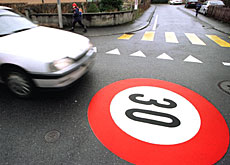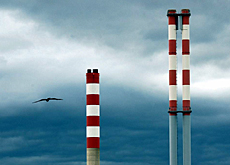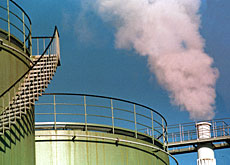Energy agency urges introduction of CO2 tax

The International Energy Agency (IEA) says the government must press ahead with plans for a tax on carbon dioxide emissions if it is to meet targets on cutting greenhouse gases.
However, the IEA also commended Switzerland for measures it had already taken to improve its energy policy.
At a news conference on Tuesday, the IEA said Switzerland still had its work cut out if it was to meet the Kyoto targets on CO2, which oblige signatory countries to lower emissions to below 1990 levels by 2010.
To achieve this, Switzerland had to give the go-ahead to a proposed tax on CO2 emissions, it said. This “incentive tax” would be used to penalise businesses that failed to cut emissions by the set amount.
The IEA is an international body with a membership of 26 industrialised countries. It is linked to the Organisation for Economic Cooperation and Development and can only issue recommendations to members on their energy policy.
Swiss energy-related fuel emissions rose by 5.6 per cent between 1990 and 2001. But the IEA says levels could drop if the tax were introduced.
Walter Steinmann, director of SwissEnergy, a government initiative to promote renewable energy, warned that any tax should not disadvantage Swiss businesses.
“I hope we’ll find a way to introduce a CO2 tax at a level that is equal to other countries,” he told swissinfo.
SwissEnergy believes a tax on CO2 emissions could be introduced as early as 2004.
Too cheap
The IEA warned that Switzerland would not reach its targets unless it made even greater changes to its energy policy.
In particular, it says, cheap heating fuel and petrol don’t encourage people to cut back on fuel consumption or use less polluting fuels, especially when the alternatives are more expensive.
William Ramsay, deputy executive director of the IEA, told swissinfo that low fuel prices were causing so-called “fuel tourism”, with drivers from neighbouring countries crossing the border to stock up on cheap petrol.
“Some 15 per cent of [Switzerland’s] transportation carbon dioxide comes from these cars,” he said. “You might be better off charging more for gasoline and sending the Swiss into France to buy their gas there.”
Positive measures
The IEA praised recent efforts by SwissEnergy to achieve what it calls the three Es: energy security, economy and environment.
To meet the Kyoto Protocol targets, SwissEnergy has introduced, or is in the process of introducing, a number of measures to clean up its emissions, much of which are enshrined in the law on CO2 emissions introduced in May 2000.
Under the law, Switzerland has pledged to reduce consumption of all heating fuels by 15 per cent and all motor fuels – petrol and diesel – by eight per cent, in order to cut emissions by ten per cent by 2010.
These measures include a set of voluntary commitments from 1,000 Swiss companies to cut their plant and factory emissions by 15 to 20 per cent by 2008.
Since January all imported cars have had to carry a label indicating their fuel consumption in a bid to get Swiss consumers to consider emission levels before buying a new car.
“I think Switzerland is quite determined to achieve this ten per cent target,” said Ramsay. “It can be done, but it will be hard.”
swissinfo with agencies
The Kyoto Protocol obliges signatories to cut CO2 emissions to below 1990 levels by 2010.
The Swiss parliament ratified the Kyoto Protocol in June.
EnergySwiss has a budget of SFr55 million ($39 million) per year.
The Swiss government wants to reduce EnergySwiss’s budget to SFr20 million.

In compliance with the JTI standards
More: SWI swissinfo.ch certified by the Journalism Trust Initiative



You can find an overview of ongoing debates with our journalists here. Please join us!
If you want to start a conversation about a topic raised in this article or want to report factual errors, email us at english@swissinfo.ch.